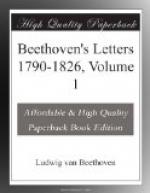[K.]
119.
TO THE ARCHDUKE RUDOLPH.
1814.
The song “Germania” belongs to the whole world who sympathize with the subject, and to you beyond all others, just as I myself am wholly yours. I wish you a good journey to Palermo.
[K.]
120.
TO TREITSCHKE.
March, 1814.
MY DEAR, WORTHY T.,—
I have read with the greatest satisfaction your amendments of the Opera ["Fidelio” which was about to be again performed]. It has decided me once more to rebuild the desolate ruins of an ancient fortress.
Your friend,
BEETHOVEN.
121.
TO TREITSCHKE.
The affair of the Opera is the most troublesome in the world, and there is scarcely one part of it which quite satisfies me now, and that I have not been obliged to amend by something more satisfactory. But what a difference between this, and giving one’s self up to freely flowing thought and inspiration!
122.
TO TREITSCHKE.
1814.
I request, my dear T., that you will send me the score of the song [in “Fidelio,” Geld ist eine schoene Sache], that the interpolated notes may be transcribed in all the instrumental parts; though I shall not take it at all amiss if you prefer that Girowetz or any other person, perhaps Weinmueller [who sang the part of Rocco], should do so. This I have nothing to say against, but I will not suffer my composition to be altered by any one whatever, be he who he may.
I am, with high consideration,
Your obedient
BEETHOVEN.
123.
TO COUNT MORITZ LICHNOWSKY.[1]
MY DEAR COUNT,—
If you wish to attend our council [about the alterations in “Fidelio"], I beg to inform you that it assembles this afternoon at half-past three o’clock, in the Spielmann Haus, auf dem Graben, No. 188, 4th Etage, at Herr Weinmueller’s. I shall be very glad if you have leisure to be present.
[Footnote 1: The mention of Weinmueller decides the date of this note, as it was in the spring of 1814 that he, together with the singers Saal and Vogl, brought about the revival of Fidelio.]
124.
TO COUNT MORITZ LICHNOWSKY.[1]
My dear, victorious, and yet sometimes nonplussed (?) Count! I hope that you rested well, most precious and charming of all Counts! Oh! most beloved and unparalleled Count! most fascinating and prodigious Count!
[Music: Treble clef, E-flat Major, 2/2 time.
Graf Graf Graf Graf (in 3-part harmony)
Graf (in 3-part counterpoint)
Graf Graf Graf, liebster Graf, liebstes Schaf,
bester Graf, bestes Schaf! Schaf! Schaf!]
(To be repeated at pleasure.)
At what hour shall we call on Walter to-day? My going or not depends entirely on you. Your
BEETHOVEN.
[Footnote 1: In Schindler’s Beethoven’s Nachlass there is also an autograph Canon of Beethoven’s in F major, 6/8, on Count Lichnowsky, on the words, Bester Herr Graf, Sie sind ein Schaf, written (according to Schindler) Feb. 20th, 1823, in the coffee-house “Die Goldne Birne,” in the Landstrasse, where Beethoven usually went every evening, though he generally slipped in by the backdoor.]




